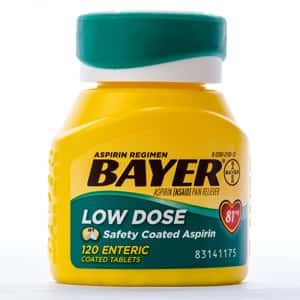
Familiarity breeds contempt, as the saying goes. Sometimes we think familiarity simply breeds a lack of caution. How could anything as ubiquitous as plain old aspirin be responsible for serious consequences? Even if people recognize that aspirin can be hard on the digestive tract and choose coated aspirin instead, they may not avoid problems. One couple discovered this the hard way.
Consequences of Coated Aspirin:
Q. My husband collapsed, unconscious, due to severe internal bleeding. He’d been taking two full-strength aspirin tablets as needed, on the advice of his doctor.
I was trying to protect his stomach, so I bought him enteric-coated aspirin. That just took the damage further down the digestive tract.
Had he been taking regular aspirin, he might have felt pain and distress in his stomach before he developed a bleeding ulcer. In that case, he probably would have seen the doctor before losing so much blood internally.
He received two pints of blood upon his arrival in the ER. I will never let him take enteric-coated aspirin again. It’s a wonderful drug, but like all drugs, it carries risks.
Coated Aspirin and the Small Intestine:
A. Doctors have long worried that aspirin might cause stomach or duodenal ulcers. Even low-dose aspirin is capable of irritating the digestive tract, resulting in a bleeding ulcer. In recent years, gastroenterologists have found that aspirin can also damage the small intestine (Endo et al, Journal of Gastroenterology, April 2015). A tablet that does not dissolve in the stomach might be riskier in this regard than ordinary buffered aspirin.
Does Coating on Aspirin Slow Its Action?
Another reader was concerned about coated aspirin being slower to act that ordinary uncoated aspirin:
Q. My doctor has recommended that I take enteric-coated aspirin to protect my heart without damaging my stomach. I have recently read that coated aspirin doesn’t always protect the heart as well as regular aspirin. Would I be safer buying low-dose chewable aspirin?
A. The study you are referring to was published in the journal Circulation (Jan. 22, 2013). Researchers gave 400 volunteers either immediate-release regular strength aspirin or a similar dose of enteric-coated aspirin.
Some of the people taking coated aspirin had a much delayed anti-clotting response. This may not matter for daily aspirin users, because eventually the level evens out. Doctors may recommend uncoated or chewable aspirin for people who suspect a heart attack in progress. That may be the only way to get the aspirin to work quickly.
Regular aspirin use has also been shown to reduce the risk of several different cancers. That doesn’t mean it is without risk. Aspirin users are more susceptible to ulcers as well as digestive tract irritation. People with swallowing problems may develop irritation in the esophagus (Clinical Journal of Gastroenterology, Dec. 2021). Aspirin use may also increase the risk of macular degeneration. Balancing benefits and risks of aspirin will be very individual and potentially complicated.
Citations
- Tatsuta T et al, "Esophageal achalasia with mucosal damage due to enteric-coated aspirin." Clinical Journal of Gastroenterology, Dec. 2021. DOI: 10.1007/s12328-021-01494-4

